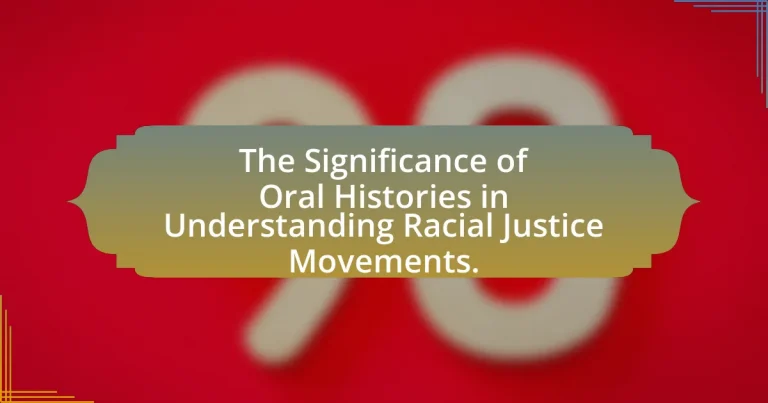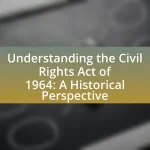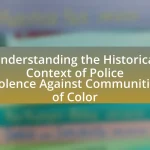The article examines the significance of oral histories in understanding racial justice movements, emphasizing their role in capturing personal narratives that reflect the lived experiences of individuals involved in these struggles. It highlights how these narratives provide unique insights into systemic racism, grassroots organizing, and the emotional contexts often absent from traditional historical accounts. Key elements such as personal testimonies, contextual background, and emotional resonance are discussed, illustrating how oral histories contribute to collective memory and empower marginalized communities. The article also addresses the challenges of collecting and preserving these histories, ethical considerations, and best practices for integrating oral histories into educational curricula and research on racial justice.
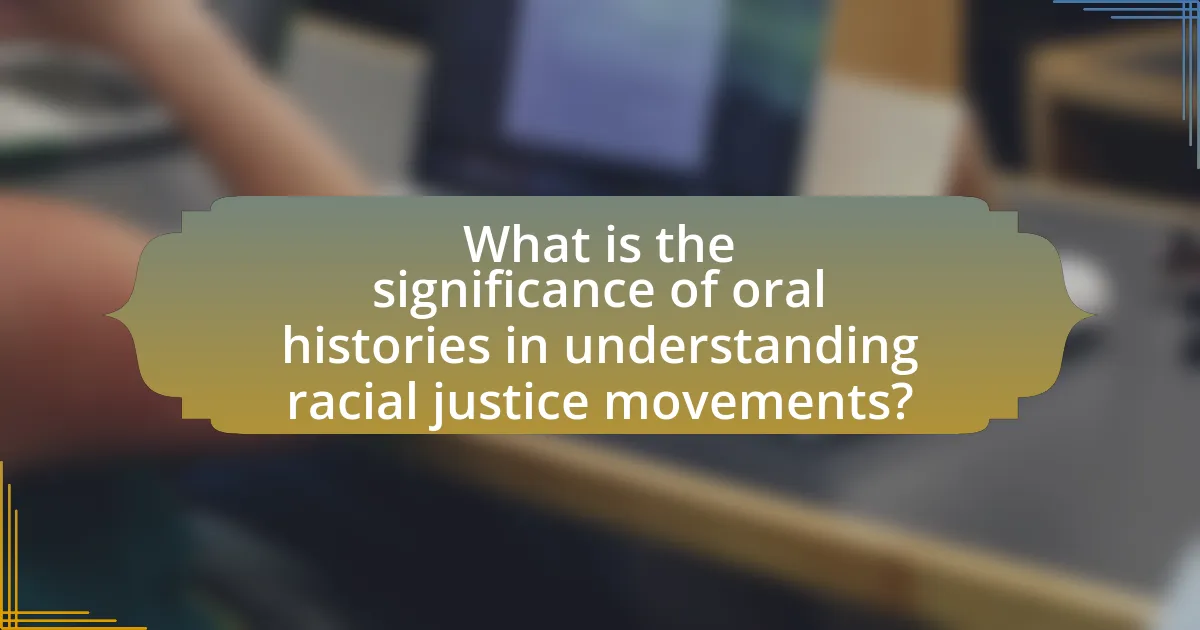
What is the significance of oral histories in understanding racial justice movements?
Oral histories are significant in understanding racial justice movements because they provide personal narratives that capture the lived experiences of individuals directly involved in these struggles. These narratives offer unique insights into the emotional and social contexts of racial injustices, which are often overlooked in traditional historical accounts. For instance, oral histories can reveal the grassroots efforts and community organizing that are pivotal in movements like the Civil Rights Movement, highlighting voices that may not be represented in mainstream historical documentation. Furthermore, studies have shown that oral histories can enhance collective memory and identity within marginalized communities, fostering a deeper understanding of the ongoing impact of systemic racism and the importance of activism.
How do oral histories contribute to the narrative of racial justice?
Oral histories contribute to the narrative of racial justice by providing personal testimonies that illuminate the lived experiences of marginalized communities. These narratives capture the complexities of systemic racism and highlight individual and collective struggles for justice, often revealing historical injustices that are overlooked in mainstream accounts. For instance, the oral histories collected during the Civil Rights Movement document firsthand accounts of discrimination, resistance, and resilience, which serve as critical evidence of the ongoing fight for racial equality. By preserving these voices, oral histories not only enrich the historical record but also empower communities to advocate for their rights and foster a deeper understanding of racial justice issues.
What are the key elements of oral histories that enhance understanding?
The key elements of oral histories that enhance understanding include personal narratives, contextual background, and emotional resonance. Personal narratives provide firsthand accounts that capture individual experiences and perspectives, making historical events more relatable and vivid. Contextual background situates these narratives within broader social, political, and cultural frameworks, allowing listeners to grasp the complexities of the events described. Emotional resonance engages audiences on a deeper level, fostering empathy and connection to the subjects of the histories. These elements collectively contribute to a richer, more nuanced understanding of racial justice movements, as they highlight the lived experiences of individuals affected by systemic injustices.
How do personal stories shape collective memory in racial justice movements?
Personal stories shape collective memory in racial justice movements by providing individual experiences that resonate with broader societal issues, fostering empathy and solidarity. These narratives serve as powerful tools for illustrating the lived realities of racial injustice, making abstract concepts tangible. For instance, the testimonies of individuals affected by police violence, such as those shared during the Black Lives Matter movement, highlight systemic issues and mobilize communities for action. Research indicates that oral histories, like those documented in the “Voices of the Civil Rights Movement” project, capture diverse perspectives and contribute to a shared understanding of historical and contemporary struggles, reinforcing the collective memory essential for sustained activism.
Why are oral histories considered a vital resource for researchers?
Oral histories are considered a vital resource for researchers because they provide firsthand accounts and personal narratives that enrich the understanding of historical events, particularly in the context of racial justice movements. These narratives capture the lived experiences, emotions, and perspectives of individuals who participated in or were affected by these movements, offering insights that traditional historical documents may overlook. For instance, oral histories can reveal the complexities of community dynamics, the impact of systemic racism, and the grassroots efforts that shaped social change, as evidenced by projects like the “Voices of the Civil Rights Movement” which document personal stories from activists. Such resources enable researchers to construct a more nuanced and comprehensive picture of history, highlighting voices that are often marginalized in mainstream accounts.
What unique perspectives do oral histories provide compared to traditional historical records?
Oral histories provide personal, lived experiences that traditional historical records often overlook. These narratives capture the emotional and subjective dimensions of events, offering insights into the motivations, struggles, and resilience of individuals involved in racial justice movements. For instance, oral histories from activists during the Civil Rights Movement reveal personal stories of discrimination and resistance that are not always documented in official records. This qualitative data enriches the understanding of historical contexts and highlights the voices of marginalized communities, making their experiences central to the narrative of history.
How can oral histories fill gaps in the historical record of racial justice movements?
Oral histories can fill gaps in the historical record of racial justice movements by providing firsthand accounts and personal narratives that are often overlooked in traditional historical documentation. These narratives capture the lived experiences of individuals involved in these movements, offering insights into their motivations, struggles, and the social context of their actions. For instance, oral histories from participants in the Civil Rights Movement reveal the emotional and psychological impacts of activism, which are frequently absent from official records. Additionally, oral histories can highlight the contributions of marginalized groups, such as women and LGBTQ+ individuals, who played crucial roles but may not be adequately represented in mainstream historical accounts. This inclusion enriches the overall understanding of racial justice movements and ensures a more comprehensive historical narrative.
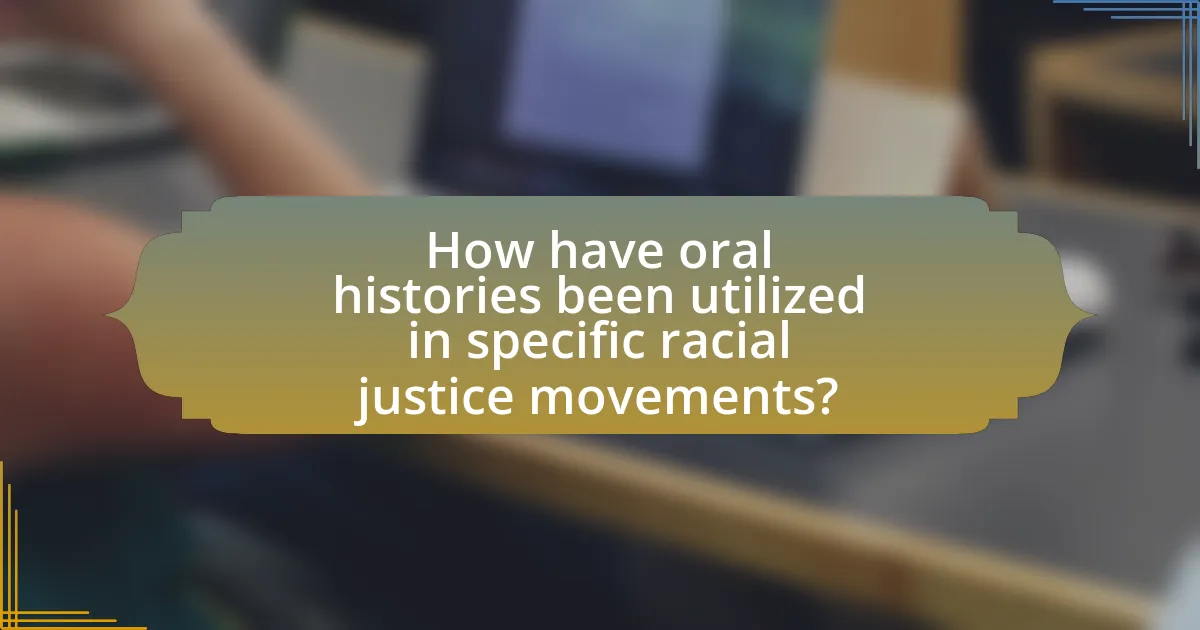
How have oral histories been utilized in specific racial justice movements?
Oral histories have been utilized in specific racial justice movements as a means to document personal experiences and testimonies that highlight systemic injustices. For instance, during the Civil Rights Movement, organizations like the Student Nonviolent Coordinating Committee (SNCC) collected oral histories from activists and community members, which provided firsthand accounts of discrimination and resistance. These narratives were crucial in shaping public understanding and policy changes, as they humanized the struggles faced by marginalized communities. Additionally, the Truth and Reconciliation Commission in South Africa employed oral histories to address the injustices of apartheid, allowing victims to share their stories, which contributed to national healing and accountability. Such examples illustrate how oral histories serve as vital tools for preserving collective memory and advocating for social change within racial justice movements.
What examples illustrate the use of oral histories in civil rights movements?
Oral histories have been pivotal in documenting the civil rights movements, with notable examples including the Voices of the Civil Rights Movement project and the Civil Rights History Project. The Voices of the Civil Rights Movement project, initiated by the Southern Oral History Program, collected interviews from activists, providing firsthand accounts of events like the Montgomery Bus Boycott and the Selma to Montgomery marches. The Civil Rights History Project, a collaboration between the Library of Congress and the Smithsonian Institution, gathered oral histories from key figures, such as John Lewis and Rosa Parks, capturing their experiences and perspectives on the struggle for racial equality. These oral histories serve as vital primary sources, enriching the historical narrative and offering insights into the personal experiences behind the broader movement.
How did oral histories impact the understanding of the Civil Rights Movement?
Oral histories significantly enhanced the understanding of the Civil Rights Movement by providing personal narratives that captured the lived experiences of individuals involved in the struggle for racial equality. These firsthand accounts revealed the emotional and social realities of the movement, offering insights into the motivations, challenges, and triumphs faced by activists. For instance, the collection of oral histories from participants in events like the Montgomery Bus Boycott and the Selma to Montgomery marches has documented the grassroots efforts and community organizing that were pivotal to the movement’s success. This qualitative data complements traditional historical records, allowing historians and scholars to grasp the complexities of the movement beyond mere dates and events, thus enriching the overall narrative of the Civil Rights Movement.
What role did oral histories play in the Black Lives Matter movement?
Oral histories played a crucial role in the Black Lives Matter movement by preserving personal narratives that highlight systemic racism and police violence. These firsthand accounts provided a platform for marginalized voices, allowing individuals to share their experiences and connect them to broader social justice issues. For instance, the testimonies of families affected by police brutality have been instrumental in raising awareness and fostering community solidarity, as seen in the cases of victims like Trayvon Martin and Michael Brown. By documenting these stories, oral histories not only humanize the statistics surrounding racial injustice but also serve as powerful tools for advocacy and education, influencing public perception and policy change.
How do oral histories influence contemporary racial justice activism?
Oral histories significantly influence contemporary racial justice activism by providing personal narratives that highlight systemic injustices and human experiences. These narratives serve as powerful tools for activists, enabling them to connect historical struggles with current movements, thereby fostering a deeper understanding of racial issues. For instance, the oral histories collected during the Civil Rights Movement have been utilized in modern campaigns to illustrate the ongoing impact of racism and to mobilize communities. Research indicates that storytelling through oral histories can enhance empathy and solidarity among diverse groups, making it a vital component in the fight for racial equity.
What lessons can current activists learn from past oral histories?
Current activists can learn the importance of resilience and community solidarity from past oral histories. These narratives reveal how previous movements, such as the Civil Rights Movement, relied on collective action and grassroots organizing to achieve significant social change. For instance, oral histories from activists like John Lewis highlight the necessity of building coalitions and maintaining perseverance in the face of adversity. Additionally, these accounts emphasize the value of storytelling in mobilizing support and fostering empathy, as seen in the testimonies collected by the Library of Congress’s Civil Rights History Project, which document personal experiences that resonate with broader societal issues. By studying these oral histories, current activists can adopt strategies that have proven effective in the past, ensuring their efforts are informed by historical context and community-driven approaches.
How do oral histories foster community engagement in racial justice efforts?
Oral histories foster community engagement in racial justice efforts by preserving and sharing personal narratives that highlight lived experiences of racial discrimination and resilience. These narratives create a platform for marginalized voices, facilitating dialogue and understanding within communities. For instance, projects like the “StoryCorps” initiative have documented diverse racial experiences, allowing participants to connect through shared stories, which enhances empathy and collective action. Additionally, research shows that communities engaged in oral history projects report increased awareness of social justice issues and a stronger sense of solidarity, as evidenced by the “Voices of a People’s History” project, which emphasizes the importance of personal accounts in mobilizing community activism.
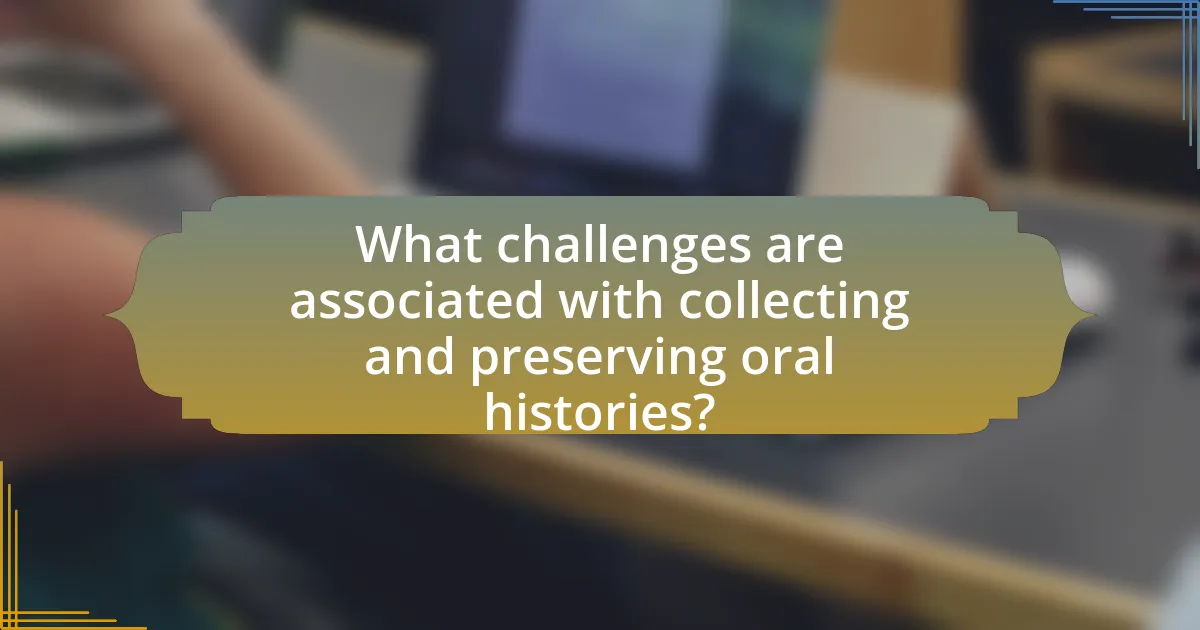
What challenges are associated with collecting and preserving oral histories?
Collecting and preserving oral histories presents several challenges, including issues of accuracy, subjectivity, and technological limitations. Accuracy can be compromised due to the reliance on memory, which may lead to inconsistencies in recounting events. Subjectivity arises as personal biases and perspectives shape the narratives, potentially skewing the representation of historical events. Additionally, technological limitations, such as inadequate recording equipment or poor archival practices, can hinder the preservation of these histories, making them vulnerable to degradation over time. These challenges underscore the complexities involved in ensuring that oral histories remain reliable and accessible for future generations.
What ethical considerations must be taken into account when gathering oral histories?
When gathering oral histories, ethical considerations include informed consent, confidentiality, and the potential impact on the interviewee. Informed consent ensures that participants understand the purpose of the interview and how their stories will be used, which is crucial for respecting their autonomy. Confidentiality protects the identity and personal information of the interviewees, especially when discussing sensitive topics related to racial justice movements. Additionally, researchers must consider the emotional and psychological effects that sharing personal experiences may have on participants, ensuring they feel safe and supported throughout the process. These ethical guidelines are essential for fostering trust and integrity in the collection of oral histories.
How can researchers ensure the accuracy and authenticity of oral histories?
Researchers can ensure the accuracy and authenticity of oral histories by employing rigorous methodologies such as triangulation, contextual analysis, and critical questioning. Triangulation involves cross-referencing oral accounts with written records, photographs, and other primary sources to validate the information provided. Contextual analysis requires researchers to understand the social, cultural, and historical background of the narrators, which can reveal biases or influences affecting their stories. Critical questioning entails probing deeper into the narratives to uncover inconsistencies or gaps, thereby enhancing the reliability of the oral histories. These methods are supported by studies that emphasize the importance of corroborating oral testimonies with established historical facts to maintain integrity in research, particularly in the context of racial justice movements where personal experiences are pivotal.
What methods are effective for preserving oral histories for future generations?
Effective methods for preserving oral histories for future generations include audio and video recording, transcription, and archiving in accessible formats. Audio and video recordings capture the nuances of speech and emotion, providing a rich context that written text alone cannot convey. Transcription of these recordings into written form ensures that the content is searchable and can be easily referenced. Archiving these materials in digital repositories or libraries allows for long-term preservation and accessibility, ensuring that future generations can engage with these histories. Research indicates that projects like the StoryCorps initiative have successfully utilized these methods to preserve diverse narratives, demonstrating their effectiveness in maintaining cultural heritage and promoting understanding of social movements, including racial justice.
How can oral histories be effectively integrated into educational curricula?
Oral histories can be effectively integrated into educational curricula by incorporating them as primary sources that provide personal narratives and diverse perspectives on racial justice movements. This integration can be achieved through structured lesson plans that encourage students to analyze oral testimonies alongside traditional historical texts, fostering critical thinking and empathy. Research indicates that using oral histories enhances students’ engagement and understanding of complex social issues, as evidenced by studies such as “The Power of Oral History in the Classroom” by the University of California, which found that students who engaged with oral histories demonstrated improved retention of historical facts and a deeper connection to the material.
What strategies can educators use to teach about racial justice through oral histories?
Educators can use strategies such as integrating personal narratives, facilitating discussions, and employing multimedia resources to teach about racial justice through oral histories. By incorporating personal narratives, educators allow students to engage with firsthand accounts that highlight the lived experiences of individuals affected by racial injustice, fostering empathy and understanding. Facilitating discussions around these narratives encourages critical thinking and reflection on systemic issues, while multimedia resources, such as video interviews or podcasts, can enhance engagement and accessibility. Research indicates that storytelling is a powerful tool for learning, as it helps students connect emotionally with historical events, making the lessons on racial justice more impactful and memorable.
How can oral histories enhance students’ understanding of social justice issues?
Oral histories enhance students’ understanding of social justice issues by providing personal narratives that illustrate the lived experiences of marginalized communities. These narratives offer unique insights into the complexities of social justice, allowing students to connect emotionally and intellectually with historical events and movements. For instance, oral histories from civil rights activists reveal the challenges and triumphs faced during the struggle for racial equality, highlighting the importance of grassroots activism. Research indicates that engaging with these personal stories fosters empathy and critical thinking, as students analyze the socio-political contexts surrounding these experiences. By incorporating oral histories into their learning, students gain a deeper appreciation for the ongoing relevance of social justice issues in contemporary society.
What are best practices for engaging with oral histories in racial justice research?
Best practices for engaging with oral histories in racial justice research include establishing trust with participants, ensuring ethical consent, and contextualizing narratives within broader historical frameworks. Building trust is crucial as it encourages participants to share their experiences openly, which is essential for capturing authentic narratives. Ethical consent involves clearly communicating the purpose of the research and how the oral histories will be used, respecting participants’ rights and privacy. Contextualizing narratives helps situate individual stories within the larger socio-political landscape, enhancing understanding of systemic issues. Research by the Oral History Association emphasizes these practices, highlighting their importance in preserving the integrity and significance of oral histories in racial justice contexts.
